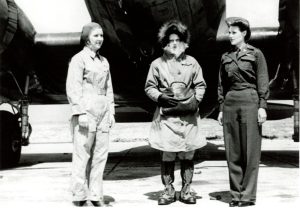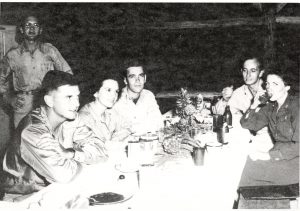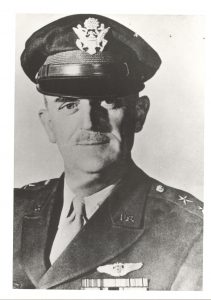In Memoriam
World War II Army Flight Nurses
Jenevieve (Jenny) Boyle Silk, who died in June 2017, was the last living of the 25 World War II US Army flight nurses whom I interviewed in 1986 for what became Beyond the Call of Duty: Army Flight Nursing in World War II. I clearly remember each of my interviews with these remarkable women and still can picture them and hear their voices when I think of them.
Twenty of these interviews are now digitized and available as audio recordings on the Imperial War Museum website. Access the interviews here:
My short remembrances are in the order in which I interviewed these former flight nurses.
Jocie French (1911–1995)
811 MAES, Europe
JOCIE HUSTON née FRENCH (Levi Memorial Hospital, Hot Springs, AR 1939) worked first in a doctor’s office, then in a veterans hospital before joining the army in 1942. But when war was declared, as Jocie recalled, “nobody wanted to stay in Veterans [Hospital]. I had everything packed.” Her chief nurse said that because of the freeze placed on staff, no nurses could be taken from the Veterans Hospital to serve in the army, but the doctors told Jocie otherwise: “’Oh, you pay no attention to that. You start writing letters, because this is no place for you during war.’ So I did. I got in at the time that I was supposed to.”
Jocie was assigned first to Fort Leonard Wood, Missouri for two months, then was sent to Sioux Falls, South Dakota to help open a new hospital, where she heard about flight nursing, quickly signed up, and was accepted. But it was six months before nurse staffing was adequate to release her to attend the flight nurse course. Finally in June 1943 Jocie was on her way to Bowman Field with the class that graduated 13 August 1943. She crossed paths with Grace Dunnam, who was preparing to take her 806 MAES nurses to England. But Jocie’s squadron, the 811 MAES, destined for England as well, had to wait at Bowman Field until December to travel overseas “for there was no place for us”.
When asked if any particular patients or air evac trips might have been more difficult than others, Jocie shared a time “we were getting a load of patients, and the flight surgeon was at the scene. And he said, ‘Well, now, this boy’s jaw is wired together, and the weather is going to be bad going back. If he gets sick, you’re going to have to clip these wires.'” Jocie continued:
My stomach began churning, because I’d never clipped wires, and I didn’t know what would happen to the patient’s mouth if I did have to. And we had no ground contact once we got in, but we were allowed to give morphine. That was all we had – I mean, they didn’t have the modern drugs – and we didn’t have to have a doctor’s order to give it [morphine] if we felt it had to be given. So I thought, Well, I’ll just give you an eighth of a grain of morphine. I did, and the blessed little fellow slept all the way over, and everybody else on that plane got sick.
By the end of the flight she wished she’d given all the patients morphine.
Asked if she had any advice to pass along to nurses who might serve as flight nurses in wartime, Jocie replied, “Oh, gee. Most certainly to learn everything you can before you go. But I would still say, ‘Go,’ I really would.” She gave the example from a flight in a plane carrying blood and medical supplies to France. Just as they got to past the coast of England, the crew chief or perhaps the copilot
came back and said, “Get into a parachute.” And he was getting into one. We’d lost an engine. And so you asked me did I ever feel inadequate. I kept thinking, Do I get out of this parachute before we hit the water? Because I knew we had been gone long enough to be over the Channel. Or do I hit the water with the parachute? … So then is when I really wished I’d remembered a little more. But fortunately we had just gotten over the Channel, and there was a base right in England on the Channel, and the pilot turned around and went back there.
Jocie was happy as a flight nurse; her philosophy was that “we had a job to do, so we did it the best we could”. But, she mused, ” f I ever came back in a second life, I would like to go now and fly in the big planes.”
To listen to my interview with Huston, click on the link:
https://www.iwm.org.uk/collections/item/object/80011349
Because of a malfunctioning tape recorder, the interview has poor sound quality.
It gets better as the interview progresses.
Interviewed 18 Jun 1986
Learn more about my interview with Jocie on the Blog for 4 Sep 2016.
To be continued



